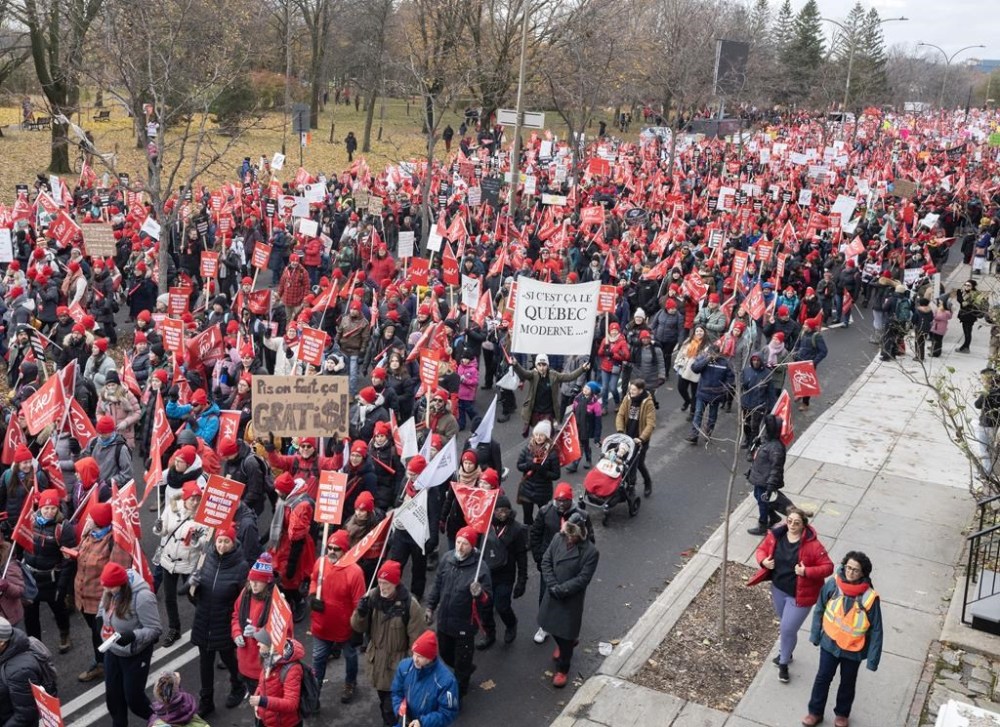Quebec teachers accuse Legault of ’emotional blackmail’ after plea to end strike
Advertisement
Read this article for free:
or
Already have an account? Log in here »
To continue reading, please subscribe:
Monthly Digital Subscription
$1 per week for 24 weeks*
- Enjoy unlimited reading on winnipegfreepress.com
- Read the E-Edition, our digital replica newspaper
- Access News Break, our award-winning app
- Play interactive puzzles
*Billed as $4.00 plus GST every four weeks. After 24 weeks, price increases to the regular rate of $19.00 plus GST every four weeks. Offer available to new and qualified returning subscribers only. Cancel any time.
Monthly Digital Subscription
$4.75/week*
- Enjoy unlimited reading on winnipegfreepress.com
- Read the E-Edition, our digital replica newspaper
- Access News Break, our award-winning app
- Play interactive puzzles
*Billed as $19 plus GST every four weeks. Cancel any time.
To continue reading, please subscribe:
Add Free Press access to your Brandon Sun subscription for only an additional
$1 for the first 4 weeks*
*Your next subscription payment will increase by $1.00 and you will be charged $16.99 plus GST for four weeks. After four weeks, your payment will increase to $23.99 plus GST every four weeks.
Read unlimited articles for free today:
or
Already have an account? Log in here »
Hey there, time traveller!
This article was published 01/12/2023 (689 days ago), so information in it may no longer be current.
QUEBEC – A striking Quebec teachers union said Friday it won’t give in to “emotional blackmail” from the premier after he asked them to return to work for the good of their students.
Premier François Legault told reporters in Quebec City that he wants the teachers to think of the children who are being harmed by the strike that is into its second week.
“What’s happening now is bad four our children,” Legault said at the provincial legislature. “I have a hard time living with the fact that our children aren’t in school.”

The union, the Fédération autonome de l’enseignement, responded on social media, saying its members are striking to prevent the further deterioration of public schools — which they say is what’s really hurting children.
“What’s hurting public schools is the deterioration of the system which has been exacerbated since you’ve been in power,” the union wrote in a social media post addressed to Legault.
The union’s 66,000 members have been on an unlimited strike since Nov. 23, shutting around 800 schools across the province.
As he called on teachers to abandon their pressure tactics, Legault said he’s already committed to improving the government’s salary offer and increasing the number of teacher’s aides. But Legault said he won’t be able meet the main demand of teachers unions, smaller class sizes, because the province doesn’t have enough teachers. Teachers aides are being offered “in exchange,” he said.
There are no plans to legislate the teachers back to work, Legault said.
“We can’t hurt our children, they’re the most precious thing we have,” he said. “We have to stop this strike, it’s going to hurt the success of our children. We already had the pandemic, so this has to stop, please.”
Union leaders were meeting for a second day Friday to evaluate the state of their negotiations with the provincial government and evaluate their options.
Several other Quebec public sector unions — including one representing 95,000 teachers — have been holding temporary strikes, with the next one scheduled to take place between Dec. 8 and Dec. 14.
Josée Scalabrini, the president of the other teachers union, the Fédération des syndicats de l’enseignement, described Legault’s comments as “very damaging” and “disrespectful.”
“We have a premier who is trying to make teachers feel guilty for demanding more services for their students,” she said in an interview.
Scalabrini questioned why, if the premier believes the teachers strike is causing problems for students, negotiations haven’t taken place for two weeks.
“If the strike is causing harm now, why doesn’t the government come to the table?” she said.
This report by The Canadian Press was first published Dec. 1, 2023.


